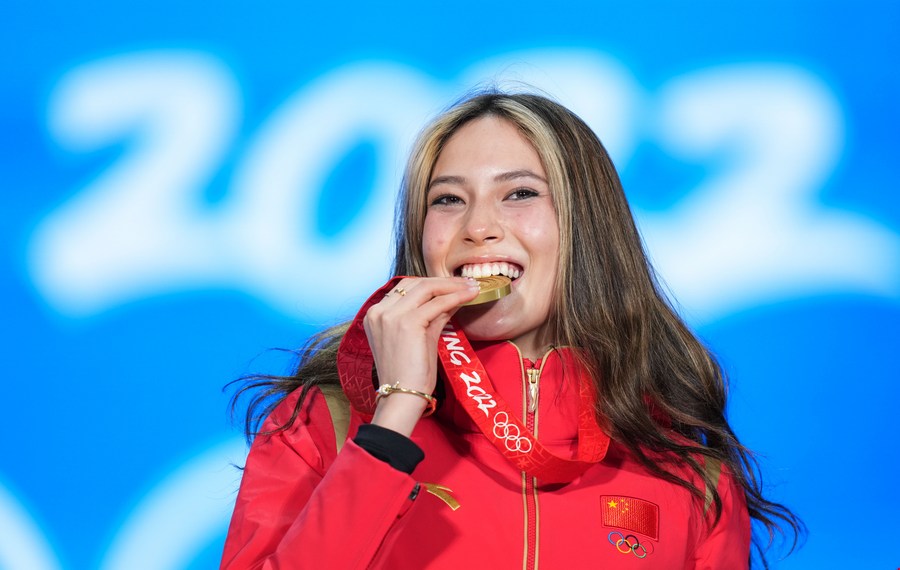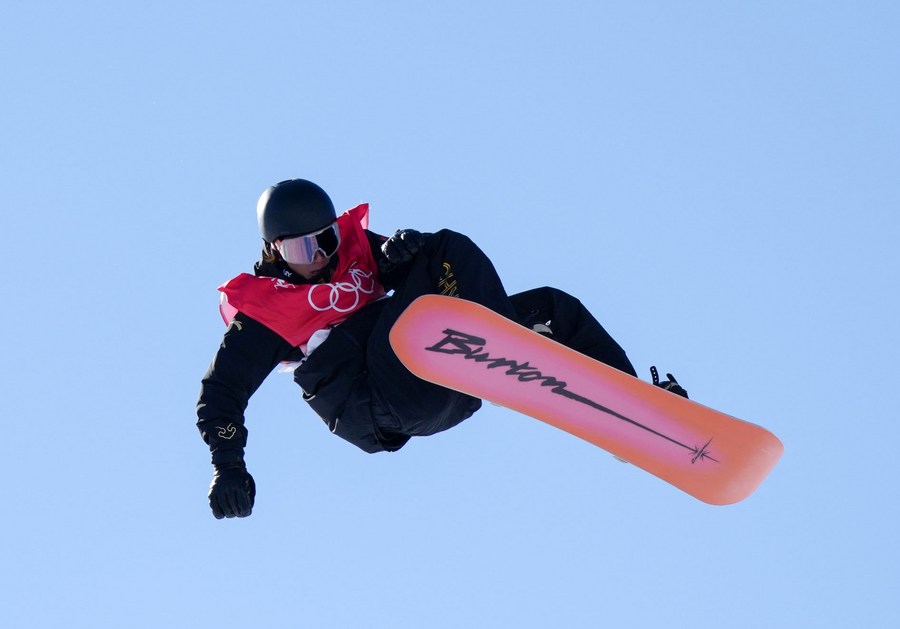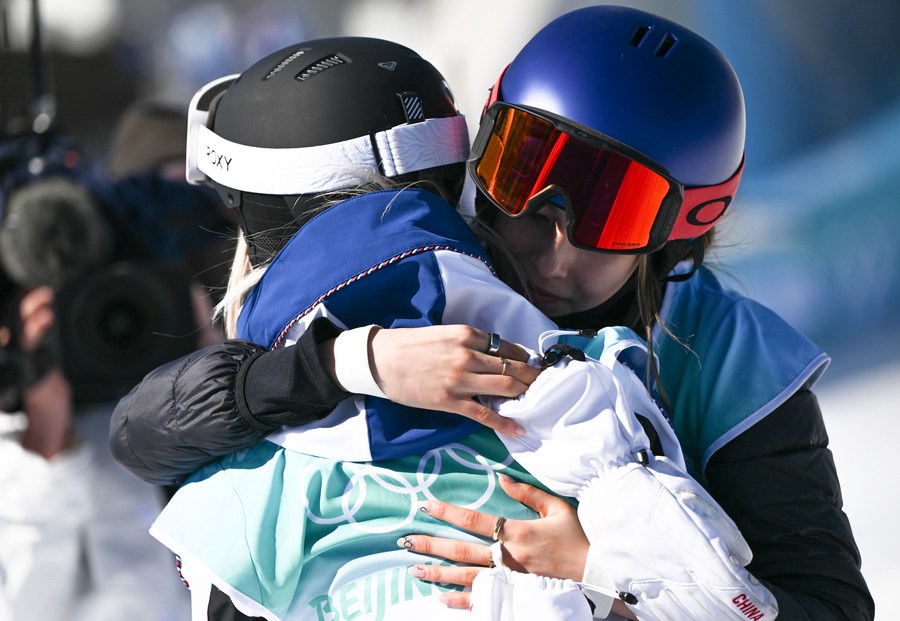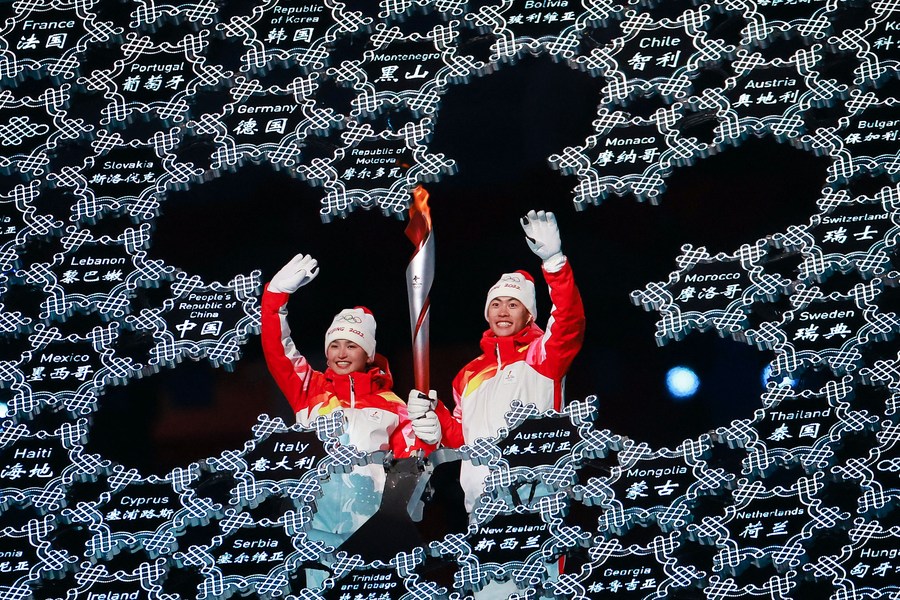
Top athletes are pushing the boundaries of what is physically possible to set new records at the Olympic Games, and the baton is always in relay from them to younger generations.

Gold medalist Gu Ailing during the awards ceremony of the women's freeski Big Air on Feb. 8, 2022. (Xinhua/Ju Huanzong)
As of Tuesday, the Chinese delegation has won three gold and two silver medals at the Winter Olympics, among which athletes born after 2000 have contributed one gold and two silvers.
For the first time in an Olympic men's snowboard slopestyle competition, a triple cork 1800 was successfully landed on Monday, by 17-year-old Chinese boarder Su Yiming.
With his highest score of 88.70 points, Su took a silver medal on his Olympic debut, also the first Olympic snowboard medal for China. The youngster saw his dream come true when he stood on the podium with his idols, Canada's Max Parrot and Mark McMorris.
"As a snowboard lover, I do not care much about the score. Instead, I pay more attention to making more brilliant tricks. The happiness comes from that," said Su.

China's Su Yiming competes during the men's snowboard slopestyle qualification at the Genting Snow Park in Zhangjiakou, north China's Hebei Province, Feb. 6, 2022. (Xinhua/Xue Yubin)
The same may be said for Gu Ailing, who pulled off a 1620 performance she had never tried before to win the women's freeski big air gold, becoming the first female Chinese athlete to be crowned in a snow sport at a Winter Olympics.
Before her final run on Tuesday, the 18-year-old sat in third place, 5.25-point behind leader Tess Ledeux of France, and 0.25-point behind second-placed Mathilde Gremaud of Switzerland. While Gu could play safe and secure a podium spot, she decided to whip out the trick she had never done before.
"I made a decision in the last five minutes. In fact, I called my mother after the second jump and then she said 'Don't do it. You can do another 1440 to try to claim a silver medal,'" recalled Gu. "I am not competing to beat other riders, not to ride better than others, but I want to ride 100 percent of my best."
When Gu secured the top place of the podium at Big Air Shougang, she did not leave the venue. Instead, she hugged to comfort Ledeux, who missed the gold by faltering on her third run.
"I want to tell her that part of the gold medal belongs to her too," said Gu, adding that it was Ledeux's completion of a 1620 in previous runs that inspired her to take the bold attempt.

Gu Ailing of China (R) and Tess Ledeux of France hug each other during the women's freeski big air final at Big Air Shougang in Beijing, Feb. 8, 2022. (Xinhua/Xue Yuge)
As a debutant in short track speed skating, Li Wenlong skated behind his teammates from the heats to the final in the men's 1,000m short track races as part of the team's tactics. Taking a silver from the event was a surprise for him.
"But I'm also very excited. The silver is just a beginning. I'm going to keep going and hope to change the color of the medal to gold one day," Li added.
In fact, even before the Games started, two post-2000s athletes had already taken center stage, as cross-country skier Dinigeer Yilamujiang and Nordic combined athlete Zhao Jiawen lit the cauldron at the opening ceremony.
"That moment will encourage me every day for the rest of my life," Dinigeer said.

Dinigeer Yilamujiang (L) and Zhao Jiawen light the Olympic cauldron at the opening ceremony of the Beijing 2022 Olympic Winter Games at the National Stadium in Beijing, Feb. 4, 2022. (Xinhua/Liu Xu)
Dinigeer won a silver medal at the FIS Beijing Cross Country Skiing Points Grand Prix in 2019, which was the best result for a Chinese skier. Zhao will be the first Chinese Nordic combined Olympian when that competition starts on Wednesday.
The torch was first relayed between five prominent Chinese athletes representing a decade of birth from the 1950s to the 1990s and passed to Dinigeer and Zhao, who jointly lit up the expectation and future of the Olympics.